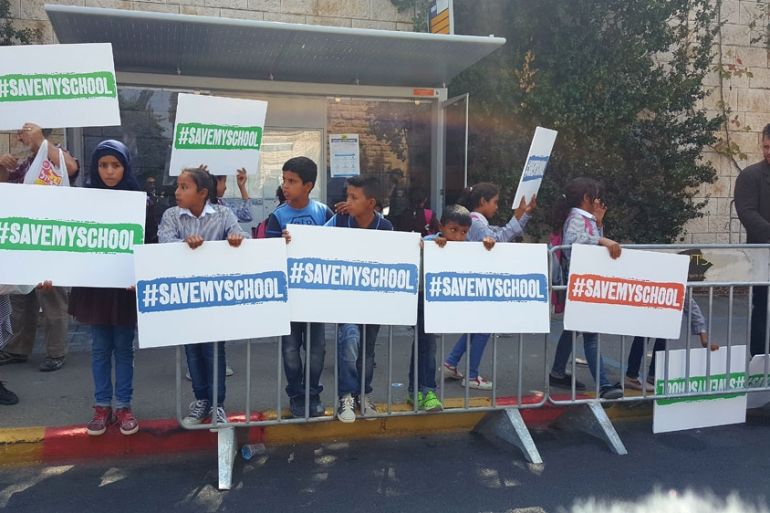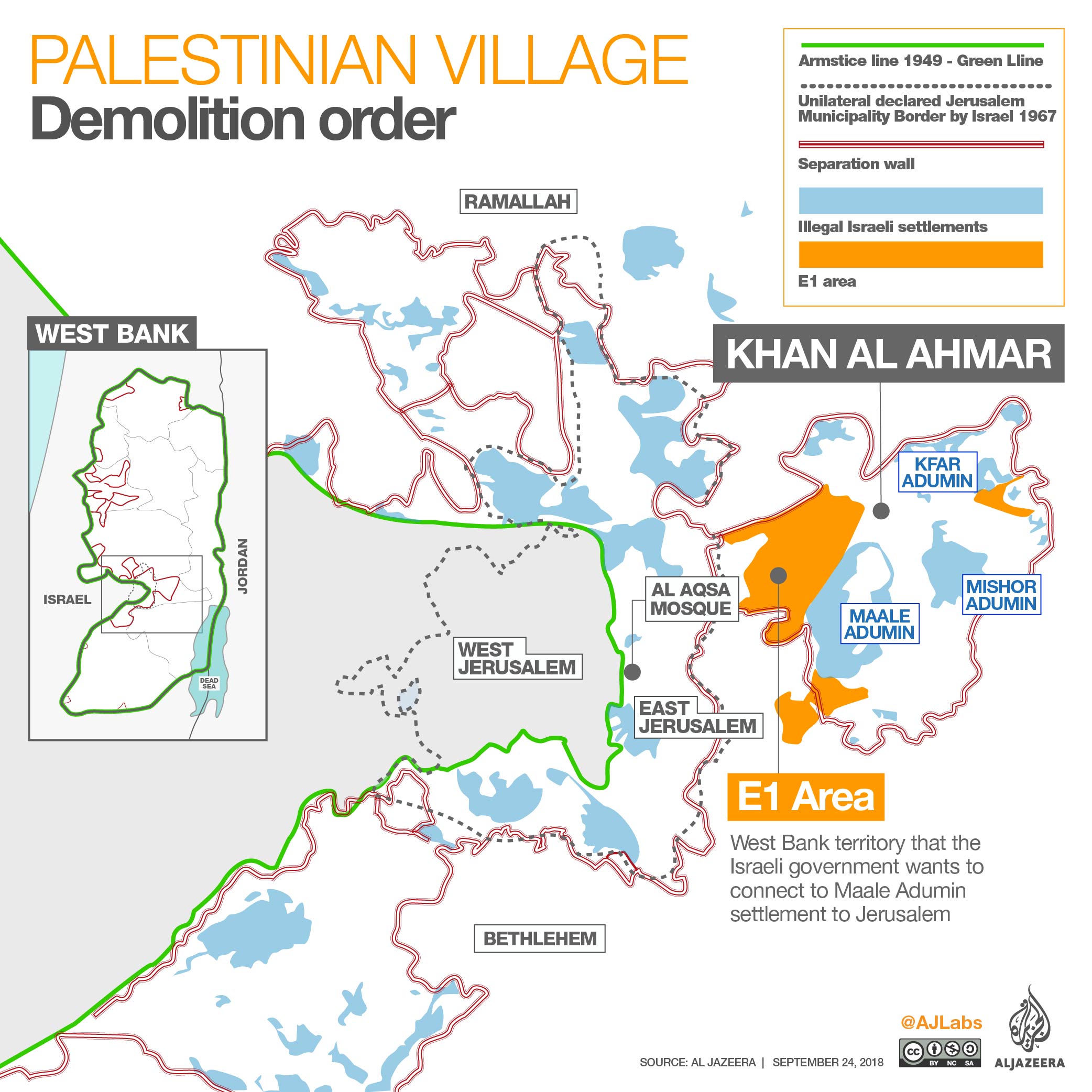Khan al-Ahmar youth stage sit-in near Israeli president’s home
Bedouin children from Khan al-Ahmar stage sit-in in Jerusalem, protesting against imminent demolition of their village.

A group of Palestinian schoolchildren from the occupied West Bank have travelled to the Israeli president’s residence to protest against the imminent demolition of their village.
Khan al-Ahmar, which has captured international attention for its years-long legal battle with Israeli authorities over its survival, is set be demolished after the Israeli military arrived on September 23 and handed notices to residents, ordering them to demolish their rudimentary shacks and structures and leave by October 1.
Keep reading
list of 4 itemsIraq’s dangerous balancing act between Iran and the US
Russia-Ukraine war: List of key events, day 783
UN’s Libya envoy resigns citing no hope for political progress
Several petitions were submitted on behalf of the Bedouin against the demolition. However, on September 5, the Israeli High Court gave the military the green light to demolish the village.
At least 18 children from the Bedouin village, aged 12 or younger, were accompanied by Jewish-American activists and travelled in three Israeli-licensed cars to President Reuven Rivlin’s residence in Jerusalem.
They passed the al-Zaeem checkpoint, which separates an illegal Jewish settlement in the West Bank from a neighbourhood that lies in occupied East Jerusalem, without incident.
However, once they arrived in the area in West Jerusalem where Rivlin lived, they were prevented by Israeli police from approaching the residence.
‘We will remain’
Their sit-in on Thursday coincided with German Chancellor Angela Merkel’s visit to Rivlin’s home, where she had lunch with the president. Her official visit to Israel had been delayed for a year and a half due to disagreements regarding Israel’s settlement policies.
On Tuesday, the children of Khan al-Ahmar held a news conference appealing to Merkel to help stop the planned eviction.
“I spent my entire life in Khan al-Ahmar,” 12-year-old Sujood Muhammad Jahalin told Al Jazeera.
“If I leave, my heart will remain attached to it, and I will not be happy anywhere else. My heart loves this place,” she said.
Along with the Jewish-American activists, the children were ordered to stay about 100 metres away from the residence.
They held up signs that read “Save My School” referring to the only school in their area, which is built out of mud and tyres.
“We’re not going listen to the Israelis. We will rebuild [our homes], and if they demolish the school, we will still remain,” Sujood said.
Khan al-Ahmar is situated a few kilometres from Jerusalem in Area C, which under the Oslo Accords is under Israeli civil and security administration and takes up 60 percent of the West Bank.
Back in May, the Israeli High Court ruled that the village and its only school would be demolished, stating that the village had been built without Israeli permission.
However, Palestinians say building permits are impossible to obtain, in contrast to the rapid expansion of illegal Jewish-only Israeli settlements in the same area.
Its location between two major illegal Israeli settlements, Maale Adumim and Kfar Adumim, has been a thorn in the side of the Israeli government, which wants to expand the two in order to build a ring of settlements around occupied East Jerusalem.
The removal of the Bedouin village would also enable the Israeli government to effectively bisect the West Bank.
Furthermore, demolishing the village would result in the forced displacement of its 180 residents, all belonging to the Bedouin Jahalin tribe.
“If they [the Israeli army] come, they will make us leave and we will have no home and no land,” Wafa Naser Ahmad Jahalin, a sixth-grader at the Khan al-Ahmar school, told Al Jazeera.
“We came here today to tell her [Merkel] not to demolish Khan al-Ahmar … If they demolish, we will build again and will remain steadfast on our land,” she said.

Appeals to Merkel to pressure Israel
In early July, Israeli bulldozers destroyed a number of tents and other structures in Khan al-Ahmar, sparking confrontations with local residents.
Husam Yousef Abu Dahouk, a sixth-grader, told Al Jazeera that he came to Rivlin’s residence to deliver a message to Merkel and the Israelis.
“We want to deliver a message to the Israelis to stop the decision to demolish Khan al-Ahmar,” he said.
“We ask Merkel to come and help us in our village,” Husam added.
Husam’s father Yousef told Al Jazeera of the phsychological suffering the children are going through, caused by the uncertainty of their future.
“Every time we hear the sound of a car approaching or a helicopter in the sky we get worried, thinking it is the army coming,” he said. “It’s such a difficult feeling, and the children and women are not sleeping.”
“These kids wanted to send a message to Merkel and to the European Union, which supports our village,” the 37-year-old continued. “I hope that Merkel looks at these children and sees them as other kids in the world, and puts pressure on the occupation to go back on its decision.”
Forced transfer violates international law
The Israeli government plans to relocate the residents of the village either to the vicinity of a sewage treatment facility near the Dead Sea or about 12km away from their homes, near the Palestinian village of Abu Dis, which is near a landfill.
Rights advocates say a forcible transfer of the residents would violate international law regarding occupied territory. Furthermore, there are fears that relocating them to an urban centre would have a devastating effect on the Bedouins, whose lives have their own distinct rhythm with gender-defined public and private domains.
Activist Angela Godfrey, one of the activists who accompanied the schoolchildren, said: “She [Merkel] can save the school, it doesn’t have to be demolished.”
“People should not be given a choice [living near] either the garbage or the sewage,” she added.
Additional reporting by Ibrahim Husseini